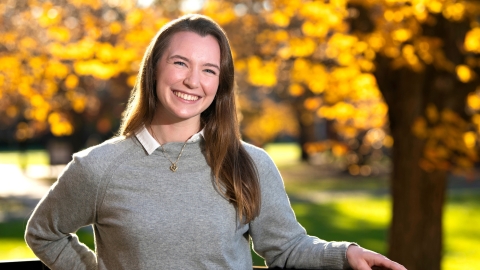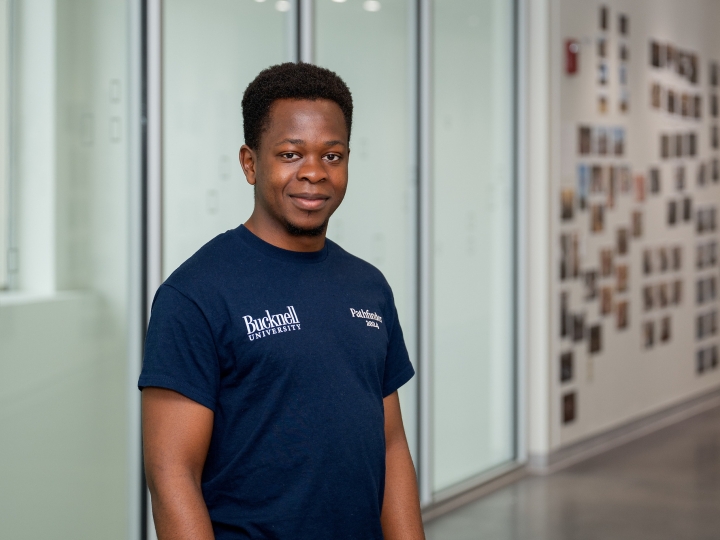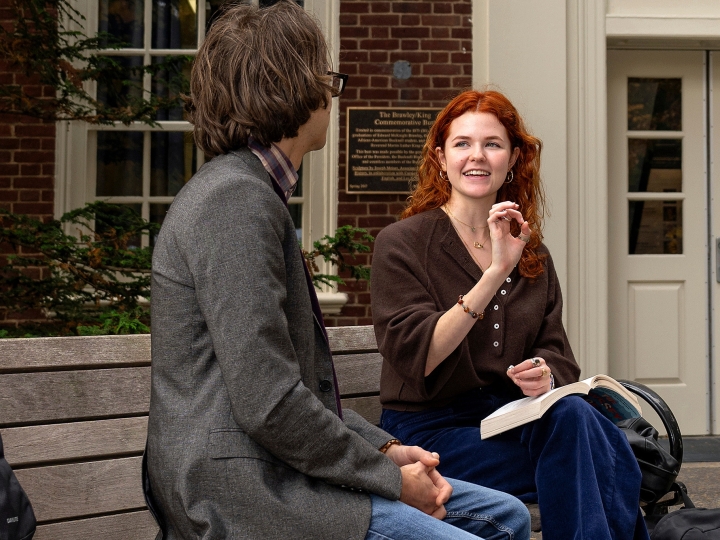
Riley DeBaecke ’23, Managing for Sustainability and Literary Studies
December 22, 2021
Riley DeBaecke '23 blends her passion for sustainability with her skills at rallying people to a cause. Photo by Emily Paine, Communications
It started with an ant farm.
Riley DeBaecke '23 still remembers this childhood gift from her grandfather. She would peer intently through a magnifying glass at the colony of insects — a tiny society right in her room. Then came a butterfly habitat. Then a subscription to National Geographic Kids.
"As I grew older, I obtained this consciousness that these animals are being hurt by humans and industrialization all the time,' " she says. "And then I educated myself more and realized that if these ecosystems are being harmed at such a high rate, that affects our civilization as well."
At Bucknell, DeBaecke selected the managing for sustainability major because she knows that businesses have the power — and the responsibility — to do better for the planet and all its living things.
"The reason I chose this major was to learn how businesses can be more sustainable. That's something I'm really passionate about," she says. "How do businesses interact with the environment, what impacts are they making and what impacts should they be making?"
The quest for those answers has given DeBaecke a hands-on outlet for her natural curiosity — a curiosity encapsulated in a quote from Joseph Heller's Catch-22: "There was no telling what people might find out once they felt free to ask whatever questions they wanted to."
Questioning Everything
The summer before her senior year of high school, at Archmere Academy in Claymont, Del., DeBaecke spent a week at a Bucknell leadership program called Bucknell Academy Summer Experience.
She got to live in the South Campus Apartments, take a variety of Bucknell chemistry and political science classes, and work in small groups to discuss solutions to world problems.
"That exposed me to interdisciplinary ways of problem-solving that I had never before considered," she says. "I just loved being here. I loved the atmosphere, and it really had me hooked. I felt like this was a place where I would belong."
To express her enthusiasm for Bucknell, DeBaecke used the most potent tool in a prospective student's arsenal: She applied Early Decision. Around that same time, DeBaecke was browsing the Bucknell website when she found the Arts Merit Scholarship, available to first-year students majoring in arts-related fields.
"I've always had a passion for writing — from grade school English classes to AP English Literature," she says.
She applied for the scholarship as a literary studies major and submitted with her application the required 1,500- to 2,000-word literary criticism. For her essay, DeBaecke explored the themes of Catch-22.
DeBaecke was admitted to Bucknell and got the scholarship, making it official: she would double-major in managing for sustainability and literary studies.
Creating Intersections
At first, these two majors might seem to exist along paths that never cross. But DeBaecke has enjoyed the freedom to create intersections by choosing courses that check multiple boxes.
That includes electives like World Literature and Environmental Justice, taught by Professor Raphael Dalleo, where DeBaecke analyzed how writers from outside of Europe and the U.S. explore issues like food access, environmental injustice, air and water pollution, and rising sea levels.
"We focused a lot on how environmental injustice affects communities," DeBaecke says. "That's something I've come to be really passionate about while I'm here."
She also relished the experience of a course called Responsible Management, Sustainable Values, taught by Professor Eric Martin. In that course, DeBaecke considered how businesses can become more sustainable while still pleasing shareholders whose primary goal is to make money.
"It's really hard. You have to think, how can we create a cultural shift in society to make that happen?" DeBaecke says. "And that's where my literary studies major comes in — we learn about the grassroots movements that make those cultural shifts happen. Sometimes literature and journalism, especially in today's media-driven world, are the catalysts for change."
Making a Difference
The kinds of changes DeBaecke wants to create, like the work she did turning trash into treasure as part of her Ray'cycle initiative, won't cease when DeBaecke crosses the Commencement stage. After graduating, she's considering a career in sustainability consulting, helping businesses be better for the planet and for the communities they serve.
"I have the passion of wanting to work with businesses, first and foremost," she says, "but I know that I have a lot of options in terms of how I can make an impact with sustainability."
To do so, she'll need to blend her writing skills with her business acumen — a challenge she conquered at Bucknell again and again.
"In 10 years, I want to be able to say that I'm devoting my time to increasing sustainability, especially in the U.S.," she says.
DeBaecke envisions herself as a company's CSO — chief sustainability officer. Not so much for the C-suite perks but because she knows that most major corporate decisions come from the top. In a course called Technological Dystopia, taught by Professor Eric Santanen, DeBaecke and her classmates talked about Apple CEO Tim Cook's climb to the top.
"Now that he's in a position of power, he can change how Apple responds to issues like data privacy," she says. "If I were ever to be in that position, how can I change the culture of sustainability? Sometimes it really does come from the top. And they all started somewhere."
Keeping Perspective
DeBaecke starts many of her Bucknell mornings on the Susquehanna River, practicing with her fellow Division I rowing athletes.
While the life of a varsity rower includes time spent in the weight room and on the "erg" (another name for an ergometer, or rowing machine), DeBaecke's favorite moments are those pre-sunrise practices on the river.
"It's exhilarating," DeBaecke says. "It really fosters my love for the environment even more every day that I'm out there. I'm watching this beautiful water, the sunrise, the trees on the adjacent riverbank and just appreciating it.”
"In school, we're so tied to our assignments, our computers, everything. Rowing gives me a way to just enjoy nature and remind myself why I'm doing sustainability."

